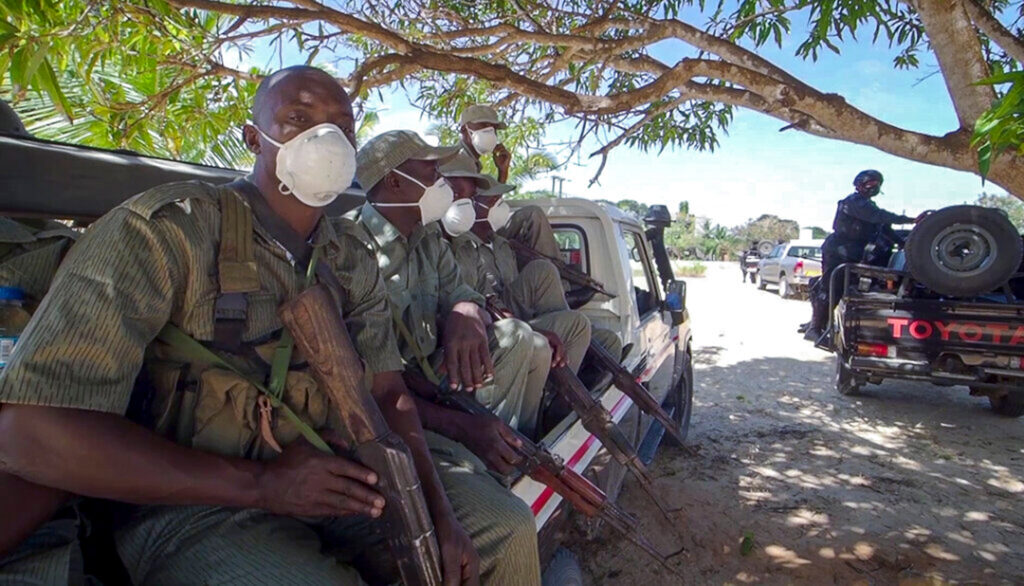ADF STAFF
As Mozambique’s neighbors in Southern Africa join its four-year fight against insurgents in the Cabo Delgado region, observers are celebrating early gains while warning of the potential for a prolonged and costly engagement.
Under the auspices of the Southern Africa Development Community (SADC), Botswana, Rwanda, South Africa and others dispatched troops to bolster Mozambique’s response to the Islamic insurgency, known locally al-Shabab. In recent years, attacks by extremists have killed 3,000 people and driven up to 800,000 from their homes.
Rwanda, which is not part of SADC, was the first nation to deploy troops to the region. In early August, the Rwandan military announced it had driven extremist fighters out of Mocímboa da Praia, the northern port city that is key to the future development of offshore natural gas reserves. Extremists had occupied Mocímboa for more than a year.
The Rwandan Army said 70 insurgents were killed in fighting. Of those who survived, some fled across the border to Tanzania while others retreated into the forests south of Mocímboa.
Rwanda’s success has allowed displaced residents to return home. The elite forces have been praised for their speed and light footprint. “They are impressive, the Prussians of modern Africa,” South African military analyst Helmoed Heitman told defenceWeb. “Their swift response is not surprising, nor that they immediately went into action.”
However, Rwanda’s small force size means that the territory they liberate must be handed over to Mozambican police and military who struggled to protect it before, said Darren Olivier, director of African Defence Review, a conflict research consultancy.
“We should be careful to assume that these initial successes mean that the insurgency is close to being defeated. It is not,” Olivier wrote for the African Centre for the Constructive Resolution of Disputes.
Olivier said the SADC should use its aerial and naval assets to monitor and disrupt the insurgents’ supply chains. The coalition of forces must be prepared to wait out the extremists and keep them isolated. “Counter-insurgency is a slog, requiring months and years of stabilise, build, and hold operations to not only displace insurgents, but deny them access to the population and interdict their supply chains,” Olivier wrote.
SADC nations agreed in June to provide 3,000 troops to assist Mozambique. So far, deployments have lagged. South Africa, which has promised 1,500 troops, has committed less than that so far.
In a report published in June, the International Crisis Group advised against SADC nations committing themselves too deeply to a conflict they don’t fully understand. They cite the attempt, under the United Nations, to subdue the Democratic Republic of the Congo’s Allied Democratic Forces extremist group. Poor cooperation with the DRC military impaired that yearslong effort, allowing the Allied Democratic Forces to continue attacking civilians, the authors noted.
“Security and Mozambican government sources fear that foreign troops with limited understanding of the local environment would similarly struggle against al-Shabab,” the authors wrote, referring to the group that has no relation to the Somali extremist group of the same name.
Mozambique would be better off using a carrot-and-stick approach to its extremists in Cabo Delgado, observers argue.
For the stick: Accept SADC military advisers, intelligence and limited combat support to back Mozambique’s own elite military forces against extremists. Zimbabwe and Botswana have committed to that process.
For the carrot: To encourage fighters to put down their guns, the government needs to address the grievances among the residents of Cabo Delgado that have given rise to extremism in the first place.
“The government should work on developing an exit corridor for surrender,” the International Crisis Group authors wrote. They cited Nigeria as an example of how to reintegrate rebels with job training and a focus on preventing security forces from abusing former extremists.
Regardless of the strategy, all agree that SADC and Mozambican forces should be ready for a prolonged fight. “History is replete with examples of armies declaring victory prematurely after a few early recaptures of territory only to have the insurgency re-emerge again and again,” Olivier wrote.

